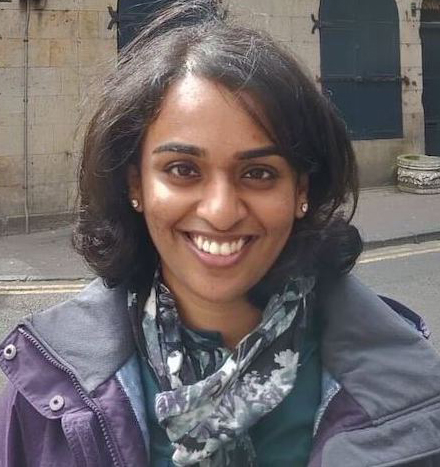Divya Ramesh chosen for Quad Fellowship in interdisciplinary studies in STEM

CSE PhD student Divya Ramesh is one of three University of Michigan doctoral candidates who have been selected for the inaugural cohort of the Quad Fellowship, a government initiative and Schmidt Futures-funded program designed to spur interdisciplinary scientific and technological innovation while building ties among the next generation of STEM leaders.
Ramesh explores algorithmic accountability models for ensuring safe interactions between marginalized users and high-risk artificial intelligence systems. She is a passionate advocate for equity and inclusion in spaces around her and strives to incorporate this lens in her research. Previously, she was awarded with the Graduate Student Service Award for Excellence in Climate, Diversity, and Inclusion, as well as a nomination by U-M for a Google PhD Fellowship.
“I’m in disbelief, and feel very honored to join this stellar cohort. I thank my advisor Nikola Banovic, and other mentors including Min Kyung Lee, Nithya Sambasivan and Vaishnav Kameswaran who reviewed my application materials. I look forward to translating insights from my research on algorithmic accountability into policy recommendations through the opportunities afforded by this fellowship,” said Ramesh.
Prior to pursuing her PhD, Ramesh led the research efforts at CloudSight Inc., where she architected the company’s first human-AI interaction pipeline that powered the award-winning accessibility app for visually impaired users, TapTapSee, which can verbally identify objects in a photo or video.
Beginning in August and extending through the 2023-24 academic year, fellows from the “quad countries” of the United States, Japan, India, or Australia will participate in regular virtual and in-person workshops on various themes, including the intersection of STEM — science, technology, engineering and math — and society, ethics and innovation and emerging technologies.
Ramesh completed her undergraduate studies at the M.S. Ramaiah Institute of Technology in Bangalore, India in 2013 and her master’s studies at USC in 2015. She is advised by Prof. Nikola Banovic. In 2020, she and her co-authors earned the Pragnesh Jay Modi Best Student Paper at the International Conference on Autonomous Agents and Multi-Agent Systems
 MENU
MENU 
